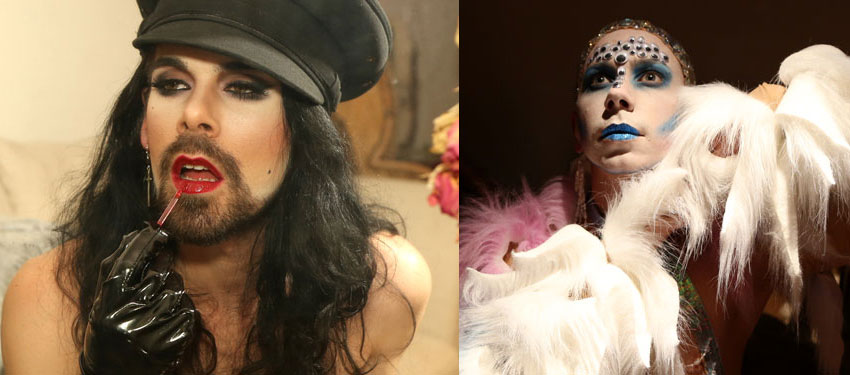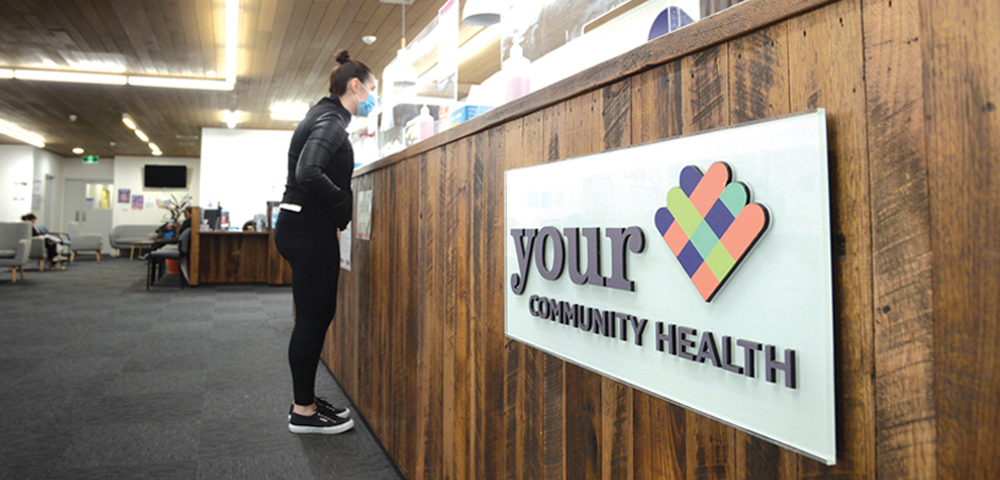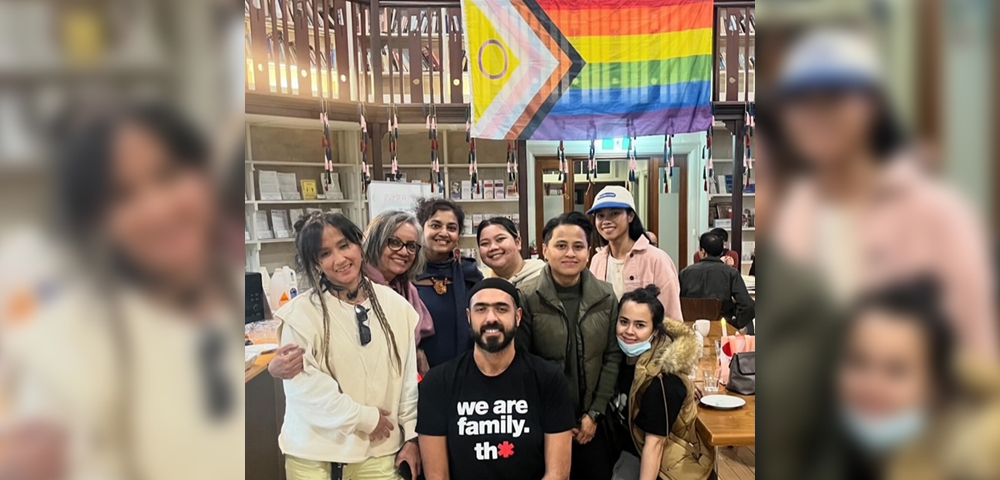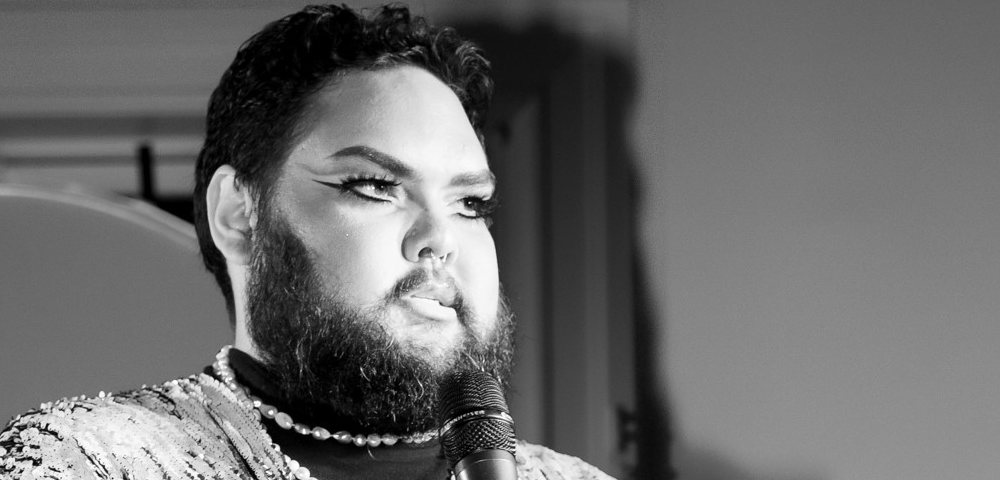
Off the main drag

CONVERSATIONS across the bar retreated into their drinks as a bearded figure in a red and black dress took to the stage.
As music began playing through the PA system, the crowd took in the performer. Black lace gloves covered his hands and forearms, and a black headscarf held a wreath of red roses in place on his head.
The song was immediately recognisable as Where the Wild Roses Grow, a duet from Australian singer/songwriter Nick Cave, performed with Kylie Minogue. It tells the disturbing story of Cave’s character seducing and eventually murdering a woman, Minogue’s Elisa Day.
What followed was a bizarre duet between the figure in the red and black dress and his other half, an unsettling plastic mask on the back of the performer’s head: a bearded man. The bearded figure became both murderer and victim, man and woman, each trying to wrest control of the performer’s body as the song crawled towards its inevitable, bloody end.
The bearded singer was Agent Cleave, a Melbourne-based drag performer who has received international recognition touring with musicians including Peaches and Amanda Palmer.
“It’s really funny, when I’m with other drag queens it’s often she, but the persona of Agent Cleave isn’t too far removed from myself, and I identify as male. So ‘he’ is totally fine as well,” Cleave said.
“I always like to describe Agent Cleave with ‘he’s the most beautiful woman in the world’.”
“I don’t shave or tuck or pad or anything like that. It’s never really an impersonation of a different gender, it’s kind of just imbuing my own gender with all of the trappings of Angelica Huston.”
All across the country, the gay scene is changing rapidly. In Melbourne and Sydney, over-the-top drag extravaganzas that were once a staple of the scene are on the decline. More and more venues are closing in the “gay ghettos” as the scene diversifies and spreads.
While a few bastions of traditional drag remain south of the river in the former spiritual home of Melbourne’s gay community, a new drag tradition is emerging from the city’s queer party scene. Over the past decade or so, exclusively gay venues have slowly been replaced by once-a-week or one-off nights and parties, frequently hosted by talented young drag performers looking to create something new.
The changing scene has brought with it very different ways of engaging with drag, a far cry from the elaborately-staged production numbers of the big gay clubs.
“Something I really love is going to a party where the punters are included,” Cleave explained.
“It’s not going and watching a show at the club, it’s sort of going to a giant dress-up party where everyone gets to put something on and express themselves with their trappings.”

Pandora’s Box is one such long-running party, hosted by Agent Cleave’s long-time collaborator, Olympia Bukkakis. Bukkakis is now based in Berlin, a long way from her origins as a country boy from the south-east Victorian town of Sale.
“Something that I’m really fascinated by is finding beauty in really hideous things. Obviously I find a lot of gutter humour really funny, but [I love] finding some sort of solace in the recognition that life is really fucking gross,” she explained.
“We all shit, we all vomit, we all have embarrassing sex, and that’s actually kind of cute… That’s absolutely my favourite thing, to be able to say something totally inappropriate and have everyone really love it.”
Bukkakis introduced Agent Cleave’s same performance of Where the Wild Roses Grow with graphic and embarrassing sex stories from the two performers’ weekends. The stories drew laughs and grimaces in equal measure from the mostly-straight crowd.
While elements of the grotesque have been a central part of drag for a long time, both Cleave and Bukkakis said that despite their desire to be challenging and even confronting, creating a friendly space is integral to how they perform.
Agent Cleave lived and performed in New York City for some time, and said despite his often-maudlin drag persona, his relative friendliness was a point of difference.
“There I stuck out like a sore thumb because I had a smile on my face and I would laugh and be really kind to people. I had the energy of the >> >> parties we had here, there,” he said, arguing there was a distinct characteristic to new drag coming out of Australia.
“As far as the way it’s executed energetically, to be from this scene in Melbourne and to take it overseas, the way that you operate yourself in the club stands out in these different places.”
Cleave said he would often encounter reactions or surprise from people perhaps expecting something cold and distant from drag performers, or worse, something mean.
The “nasty drag queen” archetype has come under attack in recent years from both inside and outside the community, with a backlash against the sexism perceived to be a staple of many traditional drag acts.
“I think the genesis of drag culture, it came from a really lovely place. It came from this idea of effeminate men aligning with a strong woman, both being silenced or oppressed,” Cleave said.
“But then as it goes along this idea of ‘I’m a hideous gay man, I don’t like myself, what’s worse than a gay man? A woman. A slutty woman.’ That idea grew out of it, that parody of the gender.”
Bukkakis said it was vital to draw a distinction between the grotesque and the oppressive, arguing drag could be confronting and challenging without needing to hurt people.
“I would never make a joke of something like, which I think is quite a common thing, ‘Ugh, look, I’m dressed as a woman, I have a vagina, vaginas smell’,” she said.
“First of all it’s tired, but more importantly, it’s sexist… in a lot of contexts, that’s just normal. You’re not making your audience think and you’re not having a very significant impact as an artist.”

In arguing Agent Cleave is very much an extension of his creator, Cleave said he was unable to hide behind his persona, to use it like a mask, or even a licence to be cruel. He believes imbuing his performance with the truth of who he is means he could never justify verbal abuse in a way other drag performers do so.
“It’s not coming from them, it’s coming from their drag character, and that’s a terrible thing to say. I don’t agree with that at all. A lot of performers say it. ‘Take a joke babe, it’s not really me, it’s just insert drag name. She’s a bitch, she’s a slut as well.’ All that kind of stuff, I can’t see the point,” he said.
While this sentiment may be a central part of the ethos of performers like Agent Cleave and Olympia Bukkakis, veterans of the local drag scene are faced with the prospect of having to tackle this issue head-on.
Tabitha Turlington has been performing in Melbourne for 25 years, and forms part of the regular line-up at the GH Hotel, one of the very few venues left in the city offering dedicated weekly drag shows. For almost 20 years, the club has built a reputation for glitzy, bombastic shows from some of Melbourne’s most well-known drag personalities.
Turlington argued nastiness isn’t as big a part of drag now compared to how queens had been in the past, when verbal assaults on audience members were just a part of the show.
“I think I was meaner. When we were young — when I started doing drag — that was the comedy. You would pick apart the audience,” she said.
“But in this day and age, you can’t. The new generation of audiences won’t put up with it… you have to change with the times.”
Like Agent Cleave and Olympia Bukkakis, Turlington believes in drawing a line between humour and vitriol, arguing that even when teasing the audience was a big part of the shows, she knew how to make sure her audiences felt like they were in good hands. Despite the gulf between their approaches to drag, Turlington and Bukkakis share a belief in the need to connect with the audience — that “taking them along with you” is key to staying on the right side of the line.
“You’ve got to say stuff like, ‘Oh you’re a slut like me.’ If you’re going to put someone down you have to put yourself down worse. That’s how you do it nicely. You don’t sabotage someone just for a laugh,” Turlington said.
She also echoed Agent Cleave’s frustration with performers who use their drag persona as an excuse to be nasty, sharing his belief that the drag persona is an extension of who she was outside of drag. For Turlington, maintaining that line between teasing and meanness is not just about doing right by the audience, it was a matter of professionalism: “You’ve either got it or you don’t.”
Turlington argued the reason she was still performing after all these years was her ability to adapt, even as the gay scene in Melbourne continued to change.
Alan Mayberry is as much an icon of the city’s drag scene as the performers themselves. He has been writing about Melbourne’s drag queens for 20 years, and said the gay scene has been shifting for a long time away from its origins south of the Yarra River. Where drag wasn’t traditionally a part of the more “blokey” gay venues north of the river — far from Tabitha Turlington’s current stomping grounds — even that is changing.
“Drag also plays an integral part for the northside attractions now. But it is more a blokey drag than offered in the south side,” Mayberry said, mentioning regular drag shows at gay club Sircuit, which is men-only on all but two nights of the week.
“It is more a quirky drag… All very gimmicky but not the Vegas-style drag that the southsiders revel in.”
Despite tastes differing among various sections of the community, Mayberry wondered whether there remained enough audience interest to warrant the expense and extravagance of old-school drag shows.
While the new drag performers may be filling a vacuum left by the diminishing role of traditional drag in the city’s gay scene, Agent Cleave pointed out the significant professional overlap between what he and Olympia Bukkakis were doing in the party scene and the traditional drag scene: Melbourne’s drag performers work together and learn from each other as much as they react to each other.
Bukkakis argued her relationship to the traditional drag scene was more complex than one defined in purely reactionary terms.
“A lot of people refer to what I and the other people I work with are doing as ‘alternative drag’, but it’s like, alternative to what?” she said.
“When I started off it was more oppositional, but I guess it’s all part of growing up. Being a teenager you oppose your parents… In the same way I said I wasn’t really interested in mainstream drag. But as I grow older the distinction is less important.”









